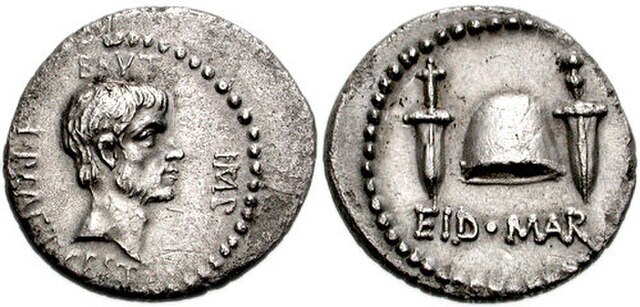Quintus Labienus Parthicus was a Roman general in the Late Republic period. The son of Titus Labienus, he made an alliance with Parthia and invaded the Roman provinces in the eastern Mediterranean which were under the control of Mark Antony. He occupied the Roman province of Syria together with the Parthians in 40 BC. He then pushed into southern Anatolia, still with Parthian support. The main Parthian force took charge of Syria and invaded Judea. Both Labienus and the Parthians were defeated by Publius Ventidius Bassus, who recovered these provinces for Mark Antony.
Bust of Quintus Labienus in Museo Civico Ala Ponzone, Italy
Labienus. Early 40 BC. AR Denarius. Uncertain mint in Syria or southeastern Asia Minor.
The Second Triumvirate was an extraordinary commission and magistracy created for Mark Antony, Lepidus, and Octavian to give them practically absolute power. It was formally constituted by law on 27 November 43 BC with a term of five years; it was renewed in 37 BC for another five years before expiring in 32 BC. Constituted by the lex Titia, the triumvirs were given broad powers to make or repeal legislation, issue judicial punishments without due process or right of appeal, and appoint all other magistrates. The triumvirs also split the Roman world into three sets of provinces.
A 19th century depiction by Jean-Léon Gérôme of Caesar's corpse and the assassins' celebration.
Coin, minted by Marcus Junius Brutus in 42 BC, depicting himself on left and commemorating the assassination of Julius Caesar on the Ides of March on right.
Coin depicting Lucius Antonius.
Sextus Pompey, depicted on an aureus minted c. 36 BC.






